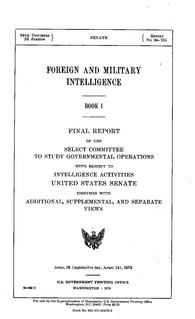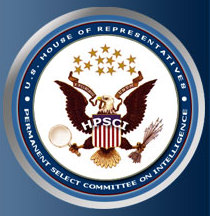Plausible deniability is the ability of people to deny knowledge of or responsibility for any damnable actions committed by others in an organizational hierarchy because of a lack of evidence that can confirm their participation, even if they were personally involved in or at least willfully ignorant of the actions. In the case that illegal or otherwise disreputable and unpopular activities become public, high-ranking officials may deny any awareness of such acts to insulate themselves and shift blame onto the agents who carried out the acts, as they are confident that their doubters will be unable to prove otherwise. The lack of evidence to the contrary ostensibly makes the denial plausible, that is, credible, although sometimes it merely makes it unactionable. The term typically implies forethought, such as intentionally setting up the conditions to plausibly avoid responsibility for one's (future) actions or knowledge. In some organizations, legal doctrines such as command responsibility exist to hold major parties responsible for the actions of subordinates involved in heinous acts and nullify any legal protection that their denial of involvement would carry.

The United States Intelligence Community (IC) is a federation of 16 separate United States government intelligence agencies and a 17th administrative office, that work separately and together to conduct intelligence activities to support the foreign policy and national security of the United States. Member organizations of the IC include intelligence agencies, military intelligence, and civilian intelligence and analysis offices within federal executive departments. The IC is overseen by the Office of the Director of National Intelligence (ODNI) making up the seventeen-member Intelligence Community, which itself is headed by the Director of National Intelligence (DNI), who reports to the President of the United States.
A covert operation is a military operation that's intended to conceal the identity of or allow plausible denial by the sponsor. It is intended to create a political effect which can have implications in the military, intelligence or law enforcement arenas affecting either the internal population of a country or individuals outside it. Covert operations aim to secretly fulfill their mission objectives without anyone knowing who sponsored or carried out the operation, or in some cases, without anyone knowing that the operation has even occurred.

The Foreign Intelligence Surveillance Act of 1978 is a United States federal law which establishes procedures for the physical and electronic surveillance and collection of "foreign intelligence information" between "foreign powers" and "agents of foreign powers" suspected of espionage or terrorism. The Act created the Foreign Intelligence Surveillance Court (FISC) to oversee requests for surveillance warrants by federal law enforcement and intelligence agencies. It has been repeatedly amended since the September 11 attacks.

The United States Senate Select Committee on Intelligence is dedicated to overseeing the United States Intelligence Community—the agencies and bureaus of the federal government of the United States who provide information and analysis for leaders of the executive and legislative branches. The Committee was established in 1976 by the 94th Congress.

The Church Committee,, a U.S. Senate select committee chaired by Idaho Senator Frank Church (D-ID) in 1975. The committee investigated abuses by the Central Intelligence Agency (CIA), National Security Agency (NSA), Federal Bureau of Investigation (FBI), and the Internal Revenue Service (IRS). The committee was part of a series of investigations into intelligence abuses in 1975, dubbed the "Year of Intelligence", including its House counterpart, the Pike Committee, and the presidential Rockefeller Commission. The committee's efforts led to the establishment of the permanent U.S. Senate Select Committee on Intelligence.

The United States President's Commission on CIA Activities within the United States was set up under President Gerald Ford in 1975 to investigate the activities of the Central Intelligence Agency and other intelligence agencies within the United States. The commission was led by the Vice President, Nelson Rockefeller, and is sometimes referred to as the Rockefeller Commission.

Operation Neptune was a 1964 disinformation operation by the Czechoslovak secret service, the StB, involving Nazi-era documents.

The United States House Permanent Select Committee on Intelligence (HPSCI), also known as the House Intelligence Committee, is a committee of the United States House of Representatives, currently chaired by Adam Schiff. It is the primary committee in the U.S. House of Representatives charged with the oversight of the United States Intelligence Community, though it does share some jurisdiction with other committees in the House, including the Armed Services Committee for some matters dealing with the Department of Defense and the various branches of the U.S. military.
In the United States, a presidential finding, more formally known as a Memorandum of Notification (MON), is a presidential directive required by statute to be delivered to certain Congressional committees to justify the commencement of covert operations by the Central Intelligence Agency (CIA).
The Hughes–Ryan Amendment was an amendment to the Foreign Assistance Act of 1961, passed as section 32 of the Foreign Assistance Act of 1974. The amendment was named for its co-authors, Senator Harold E. Hughes (D-Iowa) and Representative Leo Ryan (D-CA). The amendment required the President of the United States to report all covert actions of the Central Intelligence Agency to one or more Congressional committees.
The Directorate of Operations (DO), less formally called the Clandestine Service, is one of the smallest components of the US Central Intelligence Agency. It was known as the Directorate of Plans from 1951 to 1973; as the Directorate of Operations from 1973 to 2005; and as the National Clandestine Service (NCS) from 2005 to 2015.
Congressional oversight is oversight by the United States Congress over the Executive Branch, including the numerous U.S. federal agencies. Congressional oversight includes the review, monitoring, and supervision of federal agencies, programs, activities, and policy implementation. Congress exercises this power largely through its congressional committee system. Oversight also occurs in a wide variety of congressional activities and contexts. These include authorization, appropriations, investigative, and legislative hearings by standing committees; specialized investigations by select committees; and reviews and studies by congressional support agencies and staff.
The Gang of Eight is a colloquial term for a set of eight leaders within the United States Congress who are briefed on classified intelligence matters by the executive branch. Specifically, the Gang of Eight includes the leaders of each of the two parties from both the Senate and House of Representatives, and the chairs and ranking minority members of both the Senate Committee and House Committee for intelligence as set forth by 50 U.S.C. § 3093(c)(2).

The Intelligence Authorization Act was implemented in order to codify covert, clandestine operations and defines requirements for reporting such operations to the Congress. The American Constitution states, in Article 1, Section 9, that "a regular Statement and Account of the Receipts and Expenditures of all public Money shall be published from time to time." The act was passed along with the Intelligence Oversight Act of 1980, which allowed Congress and members of the agency to be included in important decisions and operations carried out by the Central Intelligence Agency. The Intelligence Authorization Act was also an attempt to limit the authority and secrecy within the Central Intelligence Agency (CIA) regarding foreign and domestic affairs, though its applications extends to each of the intelligence agencies, not just to the CIA.
National governments deal in both intelligence and military special operations functions that either should be completely secret, or simply cannot be linked to the sponsor. It is a continuing and unsolved question for governments whether clandestine intelligence collection and covert action should be under the same agency. The arguments for doing so include having centralized functions for monitoring covert action and clandestine HUMINT and making sure they do not conflict, as well as avoiding duplication in common services such as cover identity support, counterespionage, and secret communications. The arguments against doing so suggest that the management of the two activities takes a quite different mindset and skills, in part because clandestine collection almost always is on a slower timeline than covert action.
United States Intelligence Community Oversight duties are shared by both the executive and legislative branches of the government. Oversight, in this case, is the supervision of intelligence agencies, and making them accountable for their actions. Generally oversight bodies look at the following general issues: following policymaker needs, the quality of analysis, operations, and legality of actions.
At various times since the creation of the Central Intelligence Agency, the Federal government of the United States has produced comprehensive reports on CIA actions that marked historical watersheds in how CIA went about trying to fulfill its vague charter purposes from 1947. These reports were the result of internal or presidential studies, external investigations by congressional committees or other arms of the Federal government of the United States, or even the simple releases and declassification of large quantities of documents by the CIA.

Executive Order 11905 is a United States Presidential Executive Order signed on February 18, 1976, by President Gerald R. Ford as an attempt to reform the United States Intelligence Community, improve oversight on foreign intelligence activities, and ban political assassination. Much of this EO would be changed or strengthened by Jimmy Carter's Executive Order 12036 in 1978.

The Intelligence Authorization Act for Fiscal Year 2014 is a U.S. public law that authorizes appropriations for fiscal year 2014 for intelligence activities of the U.S. government. The law authorizes there to be funding for intelligence agencies such as the Central Intelligence Agency or the National Security Agency, but a separate appropriations bill would also have to pass in order for those agencies to receive any money.








